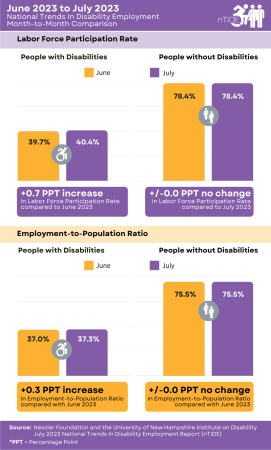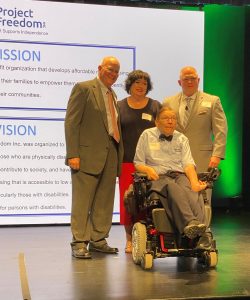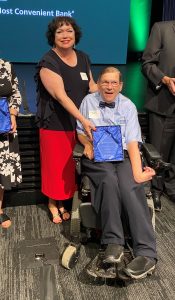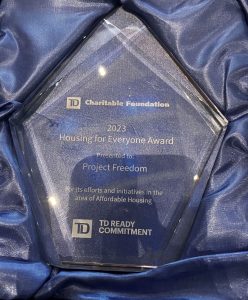The National Council on Disability (NCD), a presidentially-appointed council, has written that the foundation of a person’s ability to live, learn, work, and earn, is to have and maintain good health that encompasses mental, physical, and overall well-being. But there are great disparities in the health care system for people with disabilities to prevent this. To begin to correct some of these disparities, the NCD calls for us to be designated SMUPs. These are not little blue people!
Let’s look at why the NCD wants this designation before explaining what SMUPs are.
“For people across all categories of disabilities, attaining and maintaining good health has been elusive,” the NCD wrote in a recent report. The “unwelcoming healthcare system….for decades has failed 26% of the United States population, so much so that people with disabilities utilize the healthcare system for disease management instead of disease prevention.” People with disabilities “can even view the healthcare system as a source of potential harm.”
“It is a paradigm that exists as a result of avoidable systemic barriers within our healthcare system,” stated the NCD.
Some of NCD’s findings are:
If you are a person with a physical, intellectual, or developmental disability, your life expectancy is less than that of someone without disabilities.
You are more than three times as likely to have arthritis, diabetes, and a heart attack.
You are five times more likely to report a stroke, Chronic Obstructive Pulmonary Disease, and depression.
You are more likely to be obese.
You are significantly more likely to have unmet medical, dental, and prescription needs.
If you are a woman with a disability, you are likely to receive poorer maternity care and less likely to have received a Pap smear test or a mammogram.
If you are a pregnant woman with a disability, you have a much higher risk for severe pregnancy- and birth-related complications and eleven times the risk of maternal death.
If you are an adult who is Deaf or hard of hearing, you are three times as likely to report fair or poor health as compared to those who do not have hearing impairments.
If you have an intellectual disability, it is the strongest predictor for COVID-19 infection and the second strongest predictor for COVID-19 death.
If you live in a rural area, your disability appears to further worsen barriers to accessing healthcare.
These disparities are exacerbated if you are a person with a disability and a person of color.
NCD’s proposed solution to combat the institutional barriers in the health care system is NCD’s Health Equity for People with Disabilities Framework.
Through its research, collaboration with experts, and consultation with members of the disability community, NCD’s findings reveal five primary policy issues to build upon the advancement of health equity for people with disabilities. Drumroll, please!
They include:
- Designating people with disabilities as a Special Medically Underserved Population (SMUP) under the Public Health Services Act;
- Designating people with disabilities as a Health Disparity Population under the Minority Health and Health Disparities Research and Education Act;
- Requiring comprehensive disability clinical-care curricula in all US medical, nursing and other healthcare professional schools and requiring disability competency education and training of medical, nursing and other healthcare professionals;
- Requiring the use of accessible medical and diagnostic equipment; and
- Improving data collection concerning healthcare for people with disabilities across the lifespan.
The first component requires congressional action in terms of passing legislation. Of course, that rang my advocacy alert bells.
To achieve health equity for people with disabilities, it is critical that people with disabilities be legally identified as a Special Medically Underserved Population (SMUP) under the Public Health Service Act, with the corresponding benefits associated with that designation. Medically Underserved Population designations require population groupings based upon geography. This is not an applicable means of providing equitable healthcare to the national community of people with disabilities. To get around this technicality, people with disabilities must be designated by Congress as a Special Medically Underserved Population through a revision of Section 330 of the Public Health Service Act.
A copy of NCD’s latest report on this issue, where all of the above information was excerpted. can be found here.
I will be following this issue and will be connecting with Project Freedom’s congressional contingent (Reps. Chris Smith, Andy Kim, and Jeff Van Drew: Senators Robert Menendez and Corey Booker) to make them aware of this issue. Watch for future updates.


 Support from the TD Charitable Foundation to help with nutrition and wellness activities
Support from the TD Charitable Foundation to help with nutrition and wellness activities The grant will support Project Freedom’s organic farm program that brings fresh, New Jersey-grown food to each of its seven Mercer complexes. In addition, the organization also runs wellness programs.
The grant will support Project Freedom’s organic farm program that brings fresh, New Jersey-grown food to each of its seven Mercer complexes. In addition, the organization also runs wellness programs.
